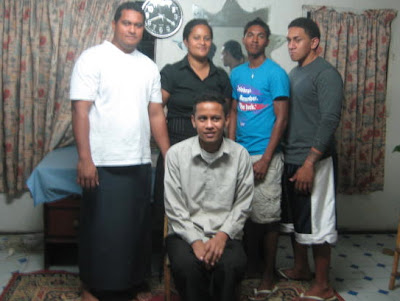Imagine yourself for a moment as an 18-year old boy, named Pahulu. You have experienced debilitating pain in every step for months, yet the doctors have no idea what is causing the pain. You have managed to get a pair of crutches, even though they are few and far between in this country. That helps you get around the house, but you don’t have the endurance for much more than that.
Oh, and you’re not living with your own family. Your parents have thrown you out of your family home, because you joined the Mormon Church. You have been taken in by Lopeti and Luseane, a generous young couple who have no children of their own, but who share their home with you and six other young adult men whose circumstances are not so different from your own. You get wonderful love and support from everyone around your, yet your heart longs for your own family.
 You long for them, but your own family feels only animosity towards you. When Lopeti informs your parents of your undiagnosed, painful condition, their reaction is to go to the family cemetery and dig your grave. Then when you do not die in a short time, the family turns to prayer – praying that you will suffer greatly, because of your choice of religion. Lopeti chides your parents: “Where is your faith? Why do you not hope for your son to be healed?” Your parents have no answer. But you hang on to Lopeti’s promise to your parents: “I will stand by him and support him with all my heart no matter what happens.”
You long for them, but your own family feels only animosity towards you. When Lopeti informs your parents of your undiagnosed, painful condition, their reaction is to go to the family cemetery and dig your grave. Then when you do not die in a short time, the family turns to prayer – praying that you will suffer greatly, because of your choice of religion. Lopeti chides your parents: “Where is your faith? Why do you not hope for your son to be healed?” Your parents have no answer. But you hang on to Lopeti’s promise to your parents: “I will stand by him and support him with all my heart no matter what happens.” |
| This house is typical of most Tongan homes. |
 |
| The Mormon chapels in Tonga are modest, but sturdy. |
Because you don’t want to be discouraged by the malice of your birth family, you have turned off your cell phone and given it to Lopeti. Better to have no contact than negative contact, at least for now. Perhaps their hearts will soften in time. And Lopeti strengthens you many times a day, reminding you to seek solace in prayer, to remain faithful and strong in the face of this adversity, to forgive your family for their ill will towards you and try to feel only love for them. You receive a priesthood blessing at the hands of a senior missionary, which provides comfort and strength, if not healing. Now you can find peace even in pain, because you know in your heart that you are safe here, you are protected and loved, and you will be the better for this experience. So you smile, and your face is an expression of calm assurance, your demeanor one of acceptance and endurance.
You know that Lopeti is a man of God, for he has shared with you a dream he had some years ago. His father also opposed Lopeti’s choice to join the Mormon Church, and died a few years before Lopeti served a mission. In the missionary training center in Provo, Utah, Lopeti dreamed he saw his father dressed in rags and in prison. His father pleaded with him to free him: “Only you have the power and authority to free me.” After a long conversation with the President of the missionary training center, Lopeti went to the Provo temple and did vicarious work for his deceased father, to provide him the opportunity to choose, in the next life, which path to take. A few nights later Lopeti dreamed of his father again, but this time his father was dressed all in white, and had tears of joy in his eyes as he held his arms out to his son, saying “thank you, thank you.” That experience helped Lopeti build his life around serving others. Not for the first time, you close your eyes in gratitude for Lopeti and Luseane, realizing how blessed you are to be the object of their service. You echo the words of Lopeti’s father: “Thank you, thank you.”
 |
| Lopeti, Luseane, with Pahulu (seated) and two of the other young men in their home. |
Ohhh, that is BEAUUUTIFUL! I hope he can be healed, too. I will keep him in my prayers! What a beautiful dream! Ohh, that gives me goosebumps! I love how the Lord lets others speak through dreams. Several of my family members have spoken to my Grandpa in dreams...he is always busy doing work on the other side and says, "Well, I need to get back to work!" haha!
ReplyDelete